Thursday, April 9, 2009, 11:24 - Commentary, Photo of the Day
It’s strange that in that most law abiding of European nations, Germany, that they are having trouble enforcing a smoking ban. I guess those Berliners are just living up to their wild and crazy reputation for bucking the trend. We learn more from The Local.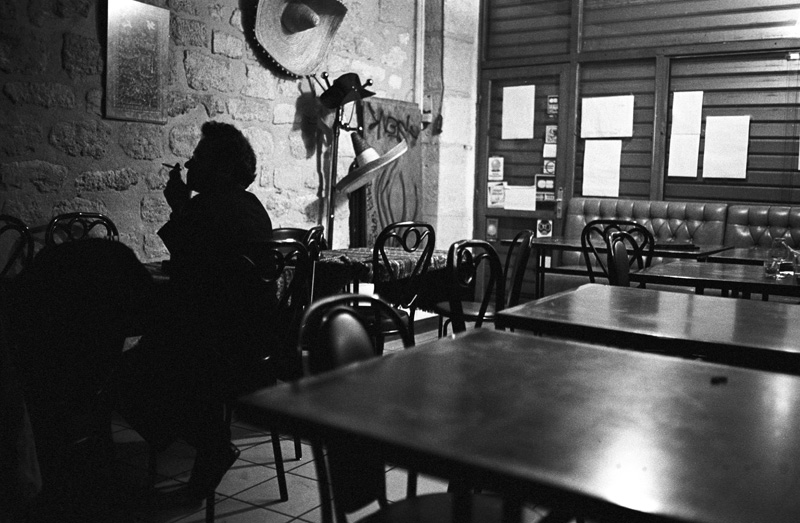
Just another puff please… Paris 2007 © Damaso Reyes
“Berlin's smoking ban is sick – it's coughing and wheezing like a dying patient desperate for attention in an apathetic hospital. In comparison, Europe's other smoking bans are striding around like robust, sturdy nurses, immune to the two viruses that have infected their German counterpart: legislative confusion and popular resentment.
“The first of these has caused noticeable damage: the ban has been so weakened by legal exceptions, constitutional interventions and the failure to enforce it that Berliners could be forgiven for thinking it had been reversed. Most bars give ashtrays to any punter who asks and sometimes even this pretence is foregone – after a few months of discretion, a lot of places just plonked them back on the tables. The realization has dawned on this city that the district authorities do not have a hope of policing the prohibition.”
Now I’m a live and let live kind of guy, just ask anybody! But this is a public health issue. The majority of people, even in Germany, don’t smoke so why should their health be damaged by those who do? You can’t smoke in a bank or on a train so what is the big deal about a bar? I guess people really like to have a puff with their pint. But the smoking ban has been extended throughout much of Western Europe without a problem, why are those Berliners so hard to wrangle? Personally I think time will prevail on this issue…
| 0 trackbacks
| 



 ( 3 / 2116 )
( 3 / 2116 )




 ( 3 / 2116 )
( 3 / 2116 )
Wednesday, April 8, 2009, 13:30 - Commentary, Photo of the Day
Isn’t it interesting that something most of us had never heard of twenty years ago, the internet, now plays such an important role in our lives? Just by reading this sentence you affirm the role of the worldwide web in your life. In Moldova the web has played a critical role in protests over the last week as we learn from the New York Times.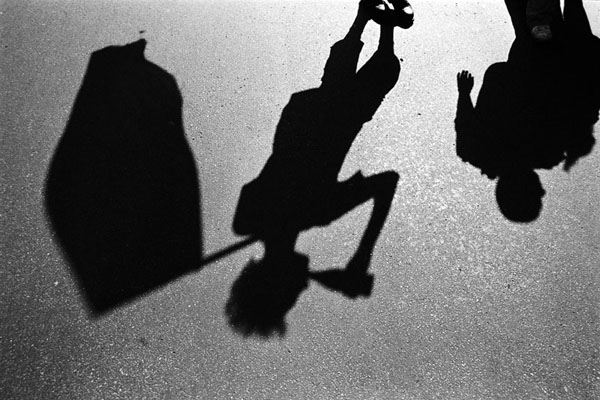
Fight for your right! Berlin 2007 © Damaso Reyes
“A crowd of more than 10,000 young Moldovans materialized seemingly out of nowhere on Tuesday to protest against Moldova’s Communist leadership, ransacking government buildings and clashing with the police.
“The sea of young people reflected the deep generation gap that has developed in Moldova, and the protesters used their generation’s tools, gathering the crowd by enlisting text-messaging, Facebook and Twitter, the social messaging network.
“The protesters created their own searchable tag on Twitter, rallying Moldovans to join and propelling events in this small former Soviet state onto a Twitter list of newly popular topics, so people around the world could keep track.”
Can you imagine what the would be revolutionaries of 1968 would have done if there had been an internet? It is harder than ever for oppressive or even simply unpopular governments in developed nations to retain an all encompassing grip on their people thanks to the combination of the internet and mobile phones. The youngest generation, those under twenty-five, have grown up with this technology so it makes sense that they use it for these purposes. What is interesting is how the web will increasingly be used in the future to organize mass movements. I think that tiny Moldova is showing us the wave of the future…
Tuesday, April 7, 2009, 11:49 - Commentary, Photo of the Day
One would think that the issue of the separation of church and state would have been largely settled in what is becoming an increasingly godless Western Europe. But from time to time the big man, or woman depending on your preference, makes an appearance. This time the spotlight moves towards our friends in Germany. We learn more from The Economist.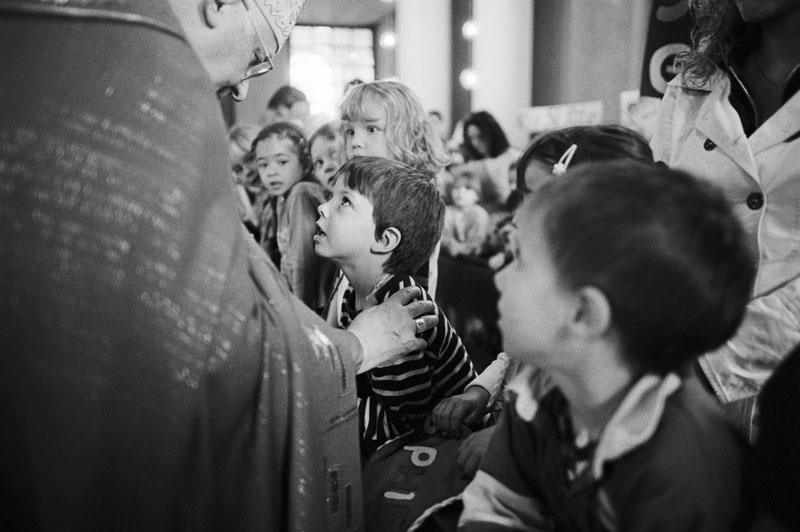
Vaya con Dios… but whose? Berlin 2007 © Damaso Reyes
“By American standards, German culture wars are mild affairs. A spat in Berlin over teaching religion in schools may be an exception. Next month the city will vote on whether schools should teach the subject as an alternative to an ethics course. The debate is only partly about how God fits into the classroom; it is also about how Muslims fit into Berlin.
“In most of Germany, the constitution already makes religious instruction part of the curriculum (secular students can opt out). But Berlin and two other states are exempt. The city’s godlessness was shaken in 2005 by the “honour killing” of a young Turkish woman. As an antidote, Berlin’s government brought in a non-religious ethics course a year later.
“For Berlin’s beleaguered believers, this was both threat and opportunity. Enrolment in (voluntary) religious classes outside school hours dropped. But some religious folk spotted a chance to sneak in more traditional teaching. Thus was born Pro-Reli, a movement that has festooned Berlin with red-and-white posters demanding “free choice between ethics and religion” and collected 270,000 signatures to force a referendum.”
Should state schools be in the business of providing religious instruction? Of course not. Should religion be taught at all, even as an academic course? I don’t think so. Many who are in favor of teaching religion in schools talk about culture and the Christian historical traditional which is so important to European identity. I point out the reformation and the Inquisition. Schools have much more important things to do with their limited time and even more limited resources than to do the work of the church and it is far, far too easy for such instruction to quickly become proselytizing. I hope that Germans are able to see the light on this issue…
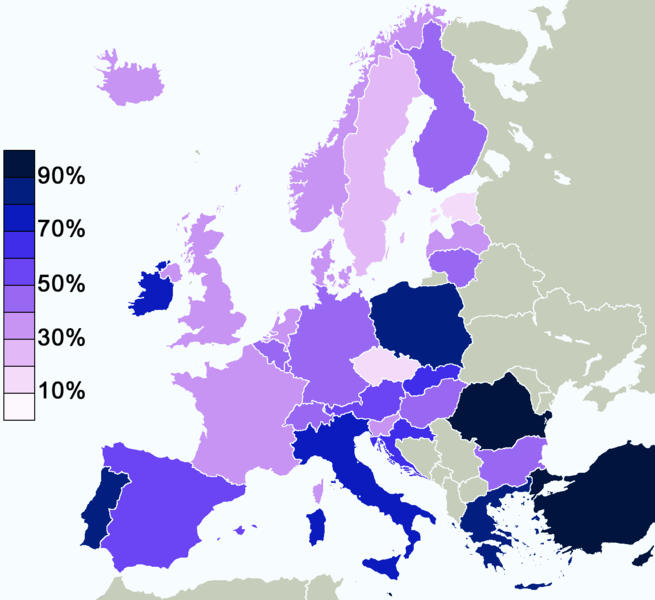
Percentage of those who believe…
Friday, April 3, 2009, 11:37 - Commentary, Photo of the Day
BrooklynWell it certainly is nice to be back in New York! Spring has arrived and I am enjoying it as much as possible. I can report however that the Guinness at the Dublin airport is tasty, lending credence to the idea that the closer one get’s to St. James’ Gate the better the brew.
Which of course leads us to today’s story about how the European Union plans to give free food to Europe’s poor in an attempt to foster some good feelings among that demographic. We learn much more from politiken.dk.

I can has yummies? © Damaso Reyes
“When a poor European sinks his or her teeth into free food from the European Union, it increases that person's support for the EU.
“That at least is one of the arguments used in the European Parliament voting in favour of donating over DKK 3.7 tax kroner in food donations to the poor.
“In the 'Explanations section, in which the background to the proposal is explained, the poor and food are coupled to popular support for the European Union.
"Apart from its benefits in reducing poverty among the Union's most deprived citizens, food distribution changes their relationship and attitude towards the European Union and the Common Agricultural Policy," the section says.
“It goes on to warn that negative attitudes towards the Union risk growing if the EU does not decide to donate food.
"Accordingly, any attempt to abolish the programme or limit its financial resources could produce an adverse public reaction, bolstering the ranks of the Eurosceptics," it says.
Not exactly the most enlightened of arguments but I suppose that one can argue that the mere fact that the E.U. has figured out that it should care about how people view them is a form of progress. Of course no amount of free food is going to really solve the issue at hand: convincing Europeans that the E.U. is a positive force in their lives and that a more integrated Europe is a good thing. This is a small step in that direction but the argument needs to be made much more forcefully if it is going to succeed.
Tuesday, March 31, 2009, 08:00 - Commentary, Photo of the Day
Stúrovo, SlovakiaGoodbye Slovakia! At least for now… I am headed to the airport and back to New York so I won’t be blogging as much this week. But in the meantime here is an interesting piece from our friends at Der Spiegel which discusses what has been happening in the twenty years since the Berlin Wall fell.
“The year 2009 is a one of remembrance for Europe. It has been two decades since the democratic revolutions of 1989, a major turning point in both European and world history. This anniversary year provides an opportunity to reflect upon the last two decades: Where was Europe in 1989? What has been accomplished since then, and where are the political deficiencies that still need to be addressed? What challenges still exist for world politics, and what role can Europe play in addressing them?
“The transition from the 1980s to the 1990s was a "moment of hope," during which almost everything seemed possible: the worldwide spread of human rights, democracy, and wealth; and for Europe, nothing less than the transformation of the Western European integration into a real union for the entire continent. Twenty years later, we are fortunate to live in a Europe that is very different from that of 1989. For the first time in its history, Europe is largely at peace. The continent has eliminated its nuclear arsenals. Even the Western Balkans, wracked by bloody ethnic-nationalist wars for much of the 1990s, are now relatively stable.
“However, 2009 is the year in which the "post-Cold War" world will definitively come to an end. With the collapse of the world's financial markets, the neoliberal triumphalism of the post-Cold War decades has been deflated for good.”

And the walls came tumbling down. Berlin 2006 © Damaso Reyes
It is very easy for us to get caught up in our own journey and to forget how much the world is changing around us. That is the very reason why I have embarked upon this project: to offer a glimpse at the changes which are happening and a world which is slowly transforming before our eyes.
This year offers a great opportunity for us to reflect on the last twenty years as well as the next. I think that the changes the future has in store for us will far outstrip anything our imagination can conceive of…
Monday, March 30, 2009, 08:15 - Commentary, Photo of the Day
Stúrovo, SlovakiaAs it always does my time here is growing short! Tomorrow I head back to New York but I can say that I had a very good time here in Slovakia. In life you never know where the road will take you and that has been very much the case here in Slovakia. I have met some interesting people and hopefully created some interesting images as well.
In the meantime, we return to a reoccurring theme here at The Europeans: the increasing use of English. This time we learn what is happening from NRC Handelsblad.

One language to rule them all. Amsterdam 2005 © Damaso Reyes
“The role of English in Dutch higher education is growing rapidly and not only in festive speeches. The proposal to make English the official language of instruction at Dutch universities was first introduced in 1990 by then education minister Jo Ritzen. If Dutch higher education wanted to continue to pull its weight in the sciences, Ritzen argued, it had to become more international.
“The intellectuals of the Netherlands were up in arms. Aside from the objection that it just won't do to squander one's own language, there was the fear that the quality of the education would suffer and the uniqueness of Dutch academics would be lost.”
It is very interesting for me to observe this debate, especially when it happens in academia, which is dominated by English. Whether a rule or law is passed English, like French before it, will become the language of international exchange. If you want your paper read outside of your home country you have no choice but to publish in English. At the same time too many non-native speakers are shy about using English, something which could be cured if English became the language of instruction. At the same time I don’t believe it is something that must be legislated. I think over time it will happen anyway so why force it?
Friday, March 27, 2009, 08:42 - Travel, Shooting
Esztergom, HungaryRecently I traveled across the river to Esztergom to photograph at the Suzuki Factory. Founded in 1991 Magyar Suzuki Corporation was one of the first examples of foreign direct investment after the end of the cold war. Today the plant turns out over 700 cars a day for the European market, and nice cars they are! Suzuki is the largest employer in Esztergom and an important part of the regional economy. Special thanks to Ruska Viktória for arranging the visit!

Stamping towards the future. © Damaso Reyes
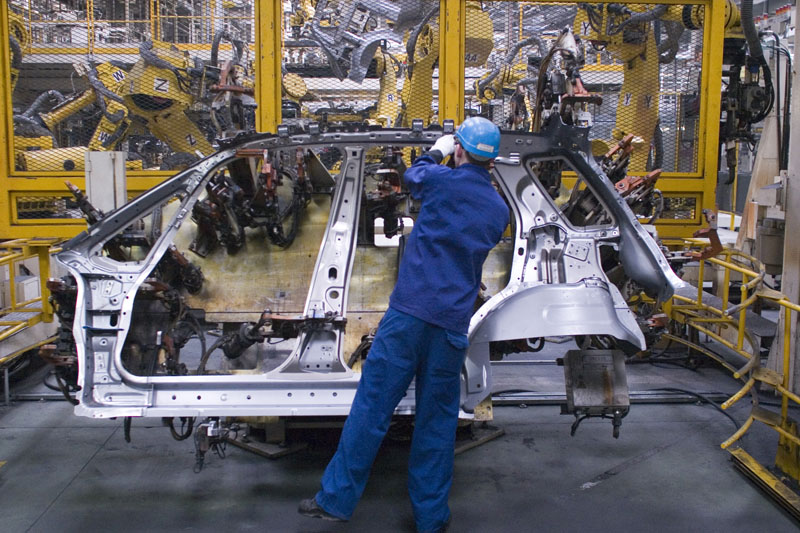
Still essential. © Damaso Reyes
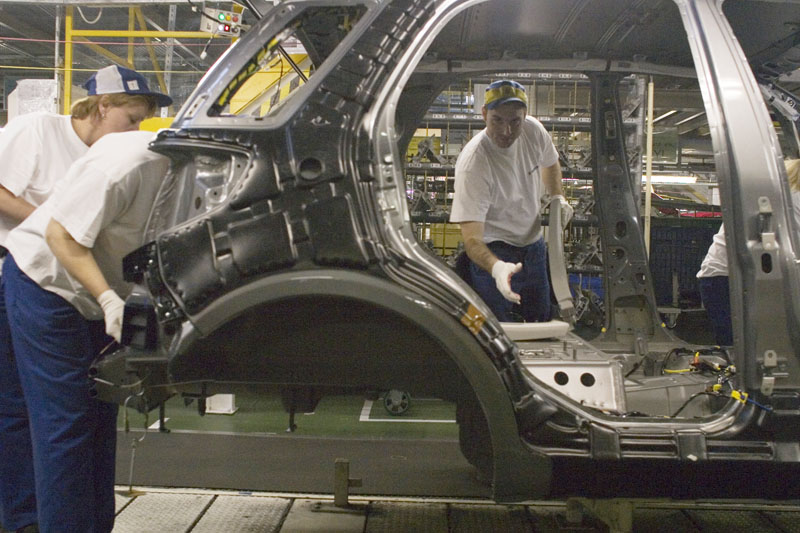
Step by step. © Damaso Reyes
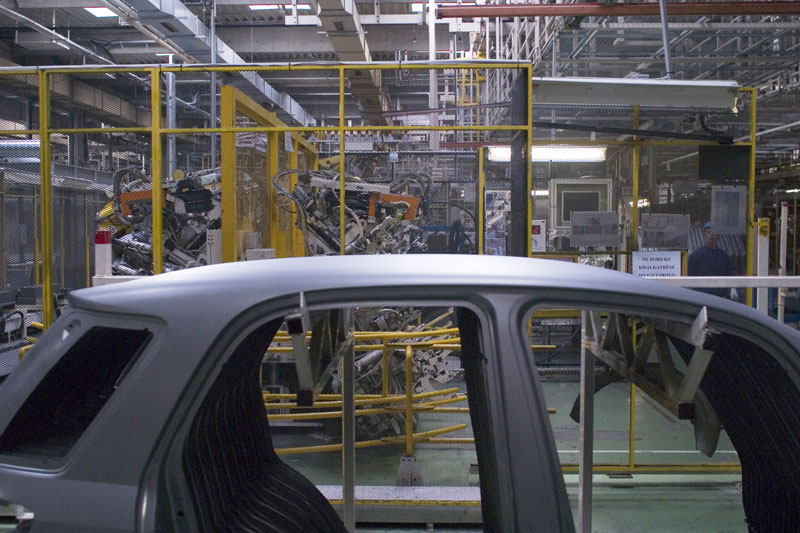
Hidden in the background. © Damaso Reyes
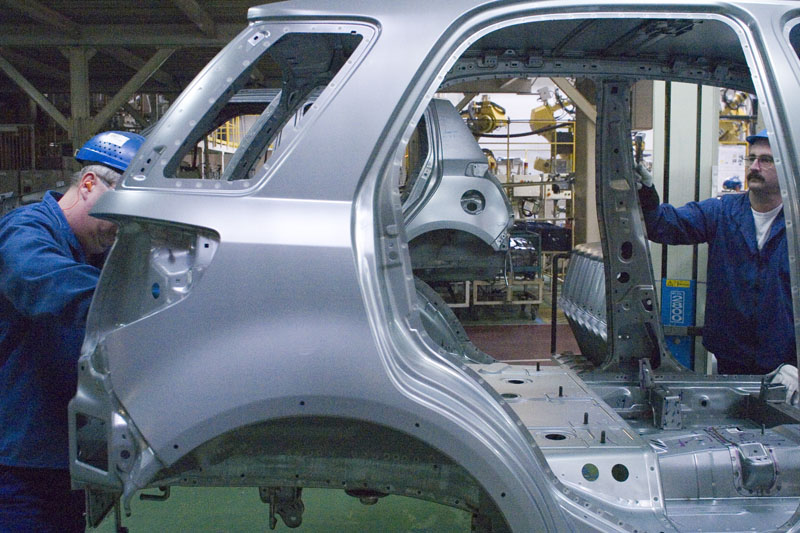
Internal structure. © Damaso Reyes
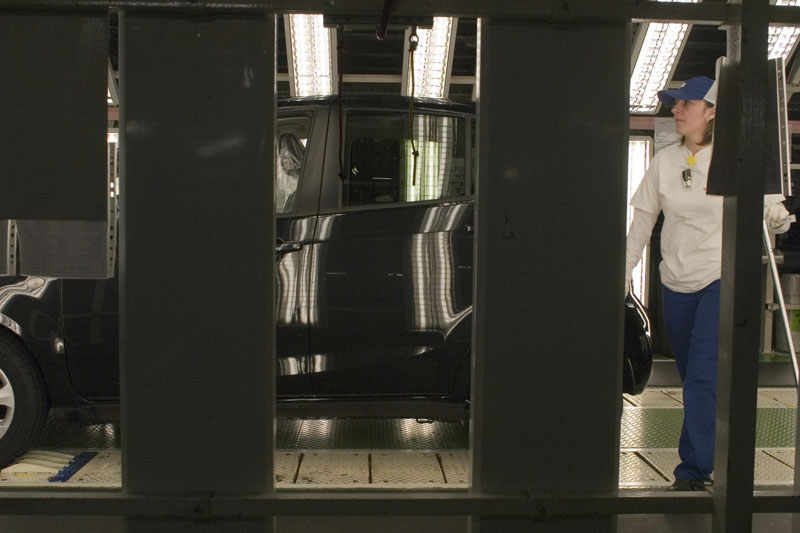
Bright lights, big factory. © Damaso Reyes
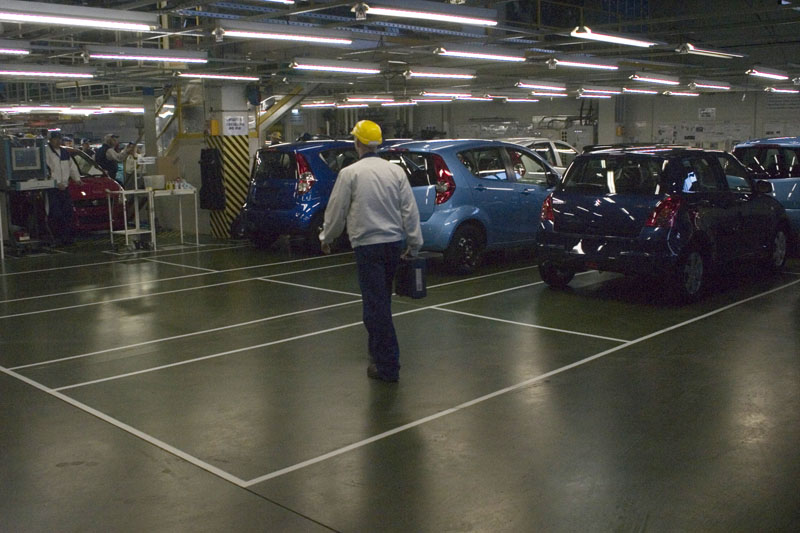
At the end of the day. © Damaso Reyes
Thursday, March 26, 2009, 08:21 - Commentary, Photo of the Day
Stúrovo, SlovakiaProgress comes in all shapes and sizes. Sometimes it’s big, like the election of Barack Obama. Most of the time it’s measured in much smaller increments. No matter how small change for the better is always welcome as we see in this article from the Guardian.
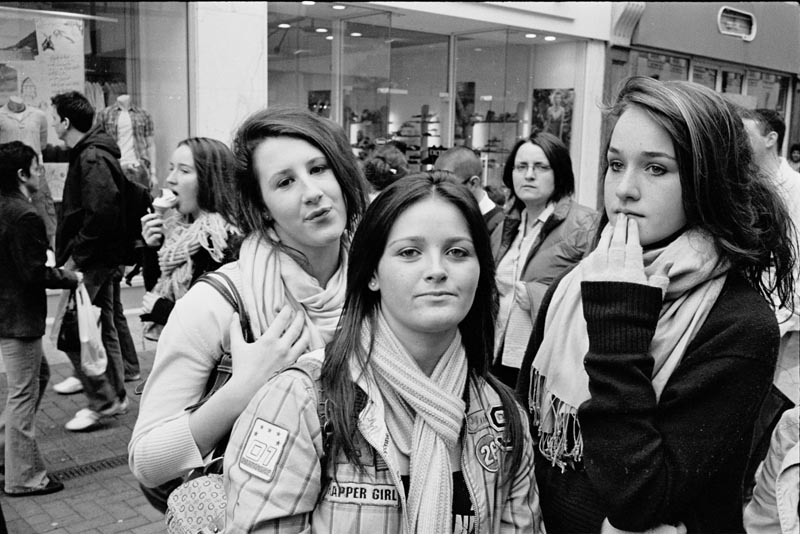
Change you say? London 2005 © Damaso Reyes
“The most extensive comparison of British and American racial attitudes over the last 50 years has found a softening of prejudice, creating the conditions necessary for a black prime minister to emerge in the UK.
“A joint study conducted by Harvard and Manchester universities has found a "deepening tide of tolerance" in the attitudes of both Americans and Britons.
“Ed Fieldhouse, the study's co-author and executive director of Manchester's Institute for Social Change, said: "The good news is that in terms of the underlying attitudes of the majority, Britain is in the same place as the United States. Whether it is willingness to work for a black boss or to welcome a non-white person into the family, majority British opinion – just like majority American opinion – is gradually getting more tolerant.”
Europe in general has a long way to go when dealing with its minorities. Certainly there needs to be a far greater representation of diversity in continent’s parliaments. But ever so slowly change, especially in attitudes, is happening. Europeans under thirty, who are more likely to have traveled, worked and studied abroad are among the most open people I have met. Let’s hope these attitudes continue to spread…
Wednesday, March 25, 2009, 08:43 - Commentary, Photo of the Day
Stúrovo, SlovakiaTimes are tough all around. If you don’t believe me, just ask the Irish. Ireland was once the belle of the ball; now the Celtic Tiger is hurting like the rest of Europe. With a 10% unemployment things will likely get far worse before they get better, as we learn from the Washington Post.
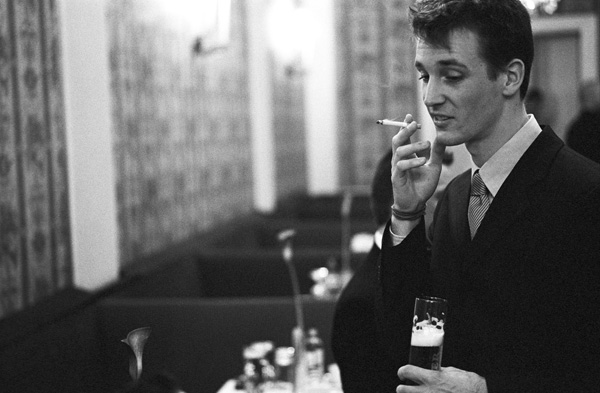
Goodbye goodtimes. Vienna 2008 © Damaso Reyes
“Niall O'Donoghue grew up in a rich country. He got an architecture degree, a top-paying job with a pay raise every year and a bonus at Christmas.
“O'Donoghue and his wife bought a house in the city and another in the country. They have two cars, two mortgages and two children under age 2. Then a month ago, O'Donoghue, 33, was laid off, jobless for the first time in his life, another well-dressed victim of one of the world's fastest and deepest economic reversals.
"It's a bit of a shock to the system, especially for my generation," O'Donoghue said one recent morning, waiting in the cold with dozens of other people in line outside the Limerick unemployment office. "I don't think things will ever be as good as they were in the last five, six or seven years. That's the bitter truth of it."
“Young Irish people accustomed to economic boom times have suddenly found themselves living a bleak page out of Irish history. Many in their 20s and 30s -- a generation raised on the assumption of jobs and prosperity at home -- have had their expectations crushed by the global economic crisis.”
Of course the news isn’t just bad of the Irish, but for the tens of thousands of immigrants who have come to the island nation during the boom. Now many are headed home with not nearly as much to show for the journey as they might have liked.
Tuesday, March 24, 2009, 08:11 - Commentary, Photo of the Day
Stúrovo, SlovakiaIn the boom times there are jobs that most of us wouldn’t bother even thinking about: washing dishes, picking fruit, driving trucks. When the boom times go bust things have a dramatic tendency to change as we read in the International Herald Tribune.
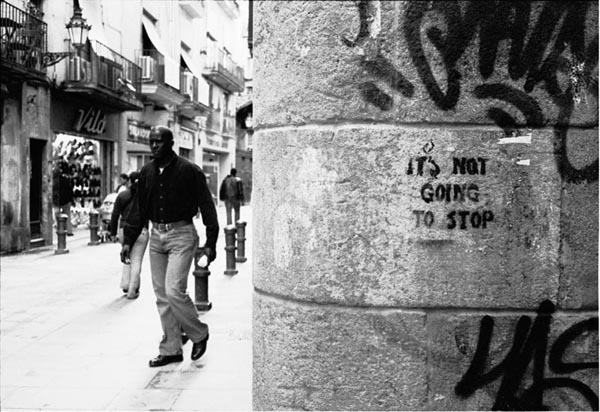
Sign of the Times… Barcelona 2005 © Damaso Reyes
“José María Gómez Jimenez thought his days of toiling in the Andalusian countryside were over. For much of the past eight years, Mr. Gómez, 29, earned about $1,900 a month plastering walls and working weekend shifts as a chef in this prosperous, strawberry-farming town. He bought an apartment, often went to parties after work and splurged on trendy sneakers.
“A year ago, Mr. Gómez lost his construction job. Now he is harvesting strawberries for $1,100 a month on a farm outside Lepe, in the Andalusian province of Huelva.
"Picking strawberries is the last resort, but it's all there is," Mr. Gómez said, stretching his back on a recent morning as he stood between rows of plants covered by polyethylene tunnels. "The fat cows have gone, and now the lean cows are here."
“As jobs disappear across Andalusia, workers like Mr. Gómez are returning to the fields they abandoned for construction sites, hotels and shops during Spain's decade-long economic boom.”
My biggest problem with the current economic situation, aside from the universal pain it is causing, is the increased economic competition that is sure to ensue. For decades there was a whole class of jobs that were only good enough for developing world immigrants. Now even E.U. citizens are desperate enough to want to fight for them. What I fear is we will see an increase to the backlash against immigrant that is already all too familiar in Europe. There are few things more feared than economic enemies and xenophobes will no doubt use this as yet another tool to rationalize their irrational fears and hatreds…
Thursday, March 19, 2009, 10:31 - Commentary, Photo of the Day
Stúrovo, SlovakiaThe large issues which face Europe are all interconnected. Earlier in the week we started by talking about immigration in Italy. Well one of the reasons Western Europe needs immigrants is because of a shrinking workforce and declining birthrate. Well European leaders are not completely asleep at the switch. Of course that does not mean that they are choosing the correct course of action as Der Spiegel explains.
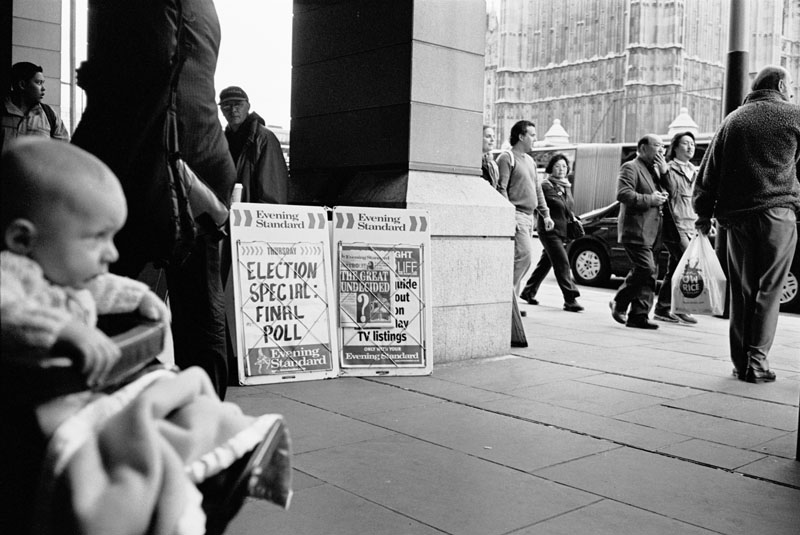
An increasingly uncommon sight. London 2005 © Damaso Reyes
“For months, it looked like Germany might have put a stop to its shrinking birth rate. Indeed, in 2007, the country actually managed a bit of population growth. And, with a fast graying population that will be knocking on the door of the local pension office in the next few decades, it was high time, too.
“But a reversal of Germany's demographic fortunes has proven to be a mirage. In October 2008, the number of births in Germany suddenly dropped. And in November, as preliminary numbers released by the German Federal Statistical Office, released on Wednesday, show, the number dropped again. Compared to November in 2007, fully 11.7 % fewer babies were born.”
Promoting families is all well and good but that will not be enough to stop the trend. In fact it is immigrants who are by and far having more babies in Germany which does nothing to keep German blood “pure.” Germany, like the rest of Western Europe needs to accept the face the fact that it needs immigrants to work in its factories, teach in its schools and work in its hospitals…
Wednesday, March 18, 2009, 09:48 - Commentary, Photo of the Day
Stúrovo, SlovakiaThe economic downturn has impacted everyone, even nations who for many years felt that they were immune to the gyrations of the marketplace. The Celtic Tiger is now whimpering but that doesn’t mean that Irish workers are not trying to fight back as we learn from the I.H.T.

Handmade, but for how much longer? Solms, Germany 2007 © Damaso Reyes
“What do you do when your employer announces that your company has shut down and that you no longer have a job, effective immediately?
“You can take the fatalistic approach and stay home, one more unhappy immigrant in the vast land of the unemployed. Or, like the employees of the Waterford Crystal factory here, which ceased operating in January, you can go to your workplace, occupy the building and refuse to leave.
"We said, 'You're not going to stop people from coming to the place they've worked all their lives, where their family worked, and where they have built up the brand themselves,' " said Tony Kelly, 51, describing how a crowd of angry employees prevailed on security guards at the headquarters to unlock the front doors and let them in, on Jan. 30.”
European workers have always been among the best organized in the world. Now they must use their collective strength to try to find a way out of the troubles all of Europe faces. As more and more companies are on the brink we are beginning to see workers fight to save the jobs and industries that politicians and businesspeople are all too often not willing to save.
Tuesday, March 17, 2009, 15:46 - Commentary, Photo of the Day
Stúrovo, SlovakiaOne of my pet peeves in Europeans foreign policy, or lack thereof. It seems like I am not the only one who is noticing that their might just be a small problem. American Secretary of State Hillary Clinton’s recent trip to Europe brought out just how uncoordinated the European Union is, as we learn from the E.U. Observer.
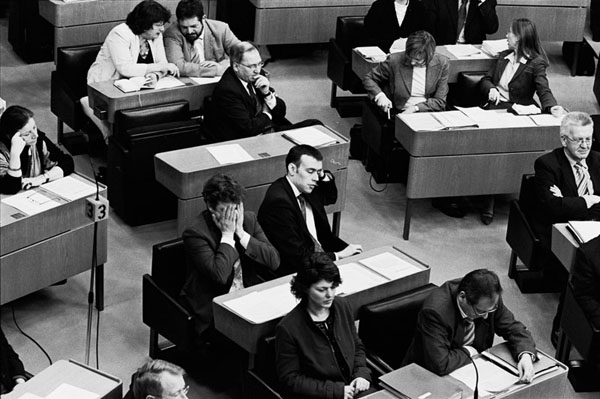
A fine mess. Stuttgart 2007 © Damaso Reyes
“In laying out with clarity a new US foreign policy, Clinton’s visit also highlighted just how fragmented Europe’s position is when it comes to serious foreign policy questions - Afghanistan, Iran, the Middle East, Russia.
“Europe’s member states may share similar principles - most shared also with the US - but when it comes to turning these into policy we are beset by our national agendas, by history, above all by the absence of leadership. The result is a policy patchwork, lacking reason or coherence, for which we apologize as best we can.”
The simple fact is that Europe can accomplish far more if it works together than its individual nations, even large ones like France and Germany, can achieve separately. But where are Europe’s leaders? Who will be brave enough to say what everyone already knows? Who will be able to look beyond simple, short term nationalistic interests and start the hard work towards building a European Union that has the power to back up the strength of its convictions?
Tuesday, March 17, 2009, 08:43 - Shooting, Events, Commentary
Esztergom, HungaryOn Sunday I walked over the bridge to Esztergom to photograph the comemeration of the Hungarian revolution which happens every year on the Ides of March. The procession winded through the town to the local cemetery. Yet another example of the pull that history has here in Europe…
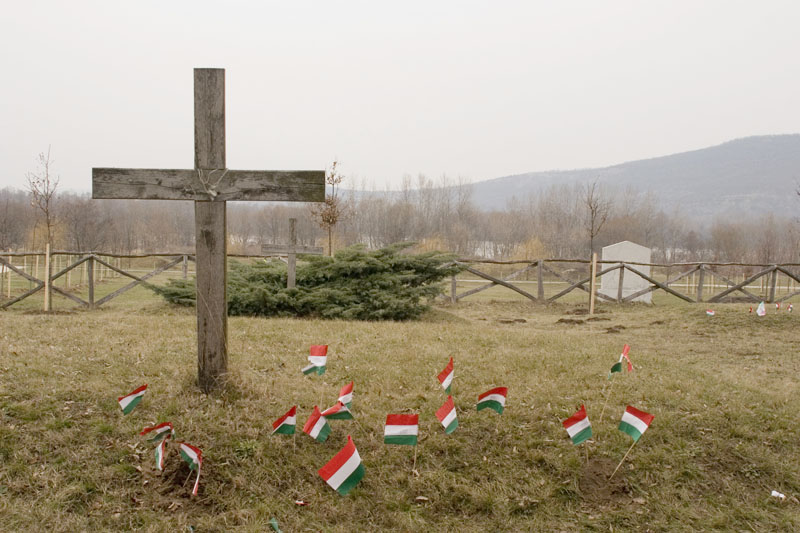
The past never goes away. © Damaso Reyes

Flags of our fathers. © Damaso Reyes
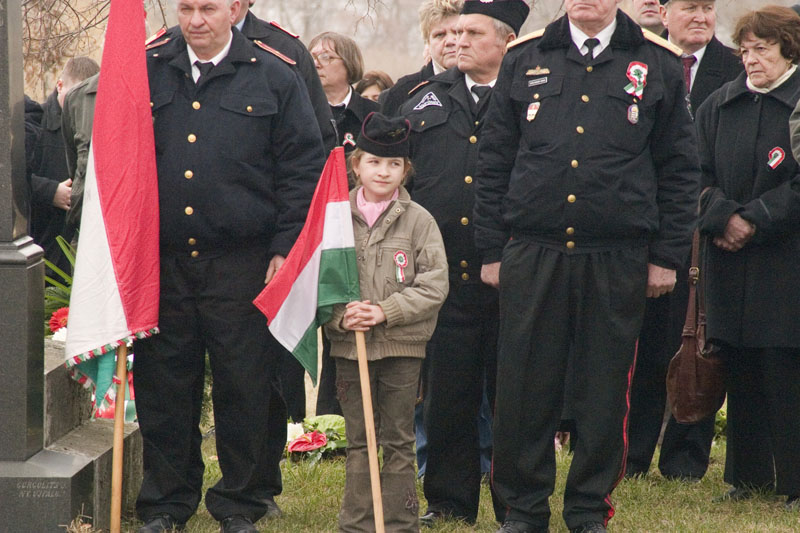
Future imperfect. © Damaso Reyes
Monday, March 16, 2009, 14:39 - Commentary, Photo of the Day
Stúrovo, SlovakiaAll too often the media’s coverage of the issue of immigration is monolithic with very little nuance, or detail for that matter. Even worse we rarely get to hear the voices of immigrants themselves, which is why this article in the International Herald Tribune is all the more important.
One Europe, many faces… © Damaso Reyes
“On one side of a drab street in working-class Milan, a squat structure houses a conservative mosque linked in the past to suspected Islamic terrorists.
“On the other, an office building houses the budding newsroom of "Yalla Italia" (Let's Go, Italy), a monthly magazine written by 2Gs - the name here for second-generation immigrants - for young Muslims juggling identities and for Italians curious about a religion and a way of life barely extant just 20 years ago here.
“The two buildings symbolize the different worlds inhabited by Italy's Muslims, a burgeoning community of more than a million that increasingly demands to be heard.”
One of the common refrains of those opposed to immigration is that new immigrants do not wish to assimilate. Of course nothing could be further from the truth. If presented with a society that welcomes them (all too often not the case in Europe) immigrants are happy to adapt to their new surroundings, after all, they came from far and wide to have a chance at a new and presumably better life. When they aren’t welcomed they find solace in one another and their common heritage.
It’s important to remember that assimilation is a process, not something with happens overnight. By the second and third generation the sons and daughters of immigrants are more at home in the nation of their birth than in the “old country.” At the same time that does not mean that they should have to abandon their heritage while making their way in their society. In New York there are more Irish bars and pizzerias than you can shake a stick at. That doesn’t make their owners any less American; in fact America would be a poorer place without the unique cultural gifts that immigrants have brought with us. It’s high time more Europeans began to understand this…
Back Next

 Calendar
Calendar




